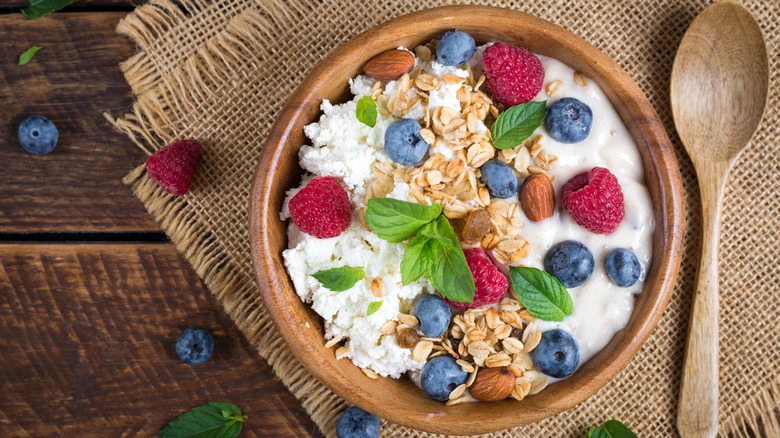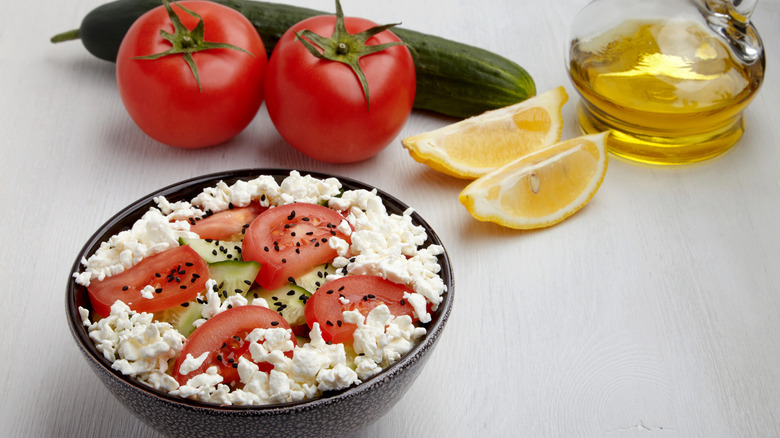Cottage Cheese Vs Greek Yogurt: Which Dairy Product Makes For A Better Breakfast?
Cottage cheese and Greek yogurt were popular breakfast options long before social media influencers made them trendy. Both low-fat, unflavored Greek yogurt and cottage cheese have nutritional profiles that are nearly identical: They contain approximately 180 calories and 25 grams of protein, and Greek yogurt has 5 grams of fat, while cottage cheese has 10 grams. Greek yogurt and cottage also have around 8 to 10 grams of carbohydrates; however, Greek yogurt has more sugar at 9 grams, while cottage cheese has 6 grams.
Where they really diverge is in calcium and sodium content. A cup of Greek yogurt has 187 milligrams of calcium and 83 milligrams of sodium, while cottage cheese contains 282 milligrams of calcium and a surprisingly high amount of sodium (709 milligrams). Since they're both fermented dairy products, they also contain probiotics, though their presence in cottage cheese is sometimes dependent on the brand.
High protein content is what really makes cottage cheese and Greek yogurt equally excellent choices for starting the day. Research indicates that consuming a high-protein breakfast helps individuals stay fuller for longer, which leads to better blood sugar regulation and improved overall bodily functions throughout the day, including enhanced cognitive performance, consistent energy levels, and better mood control.
However, the crucial factor that's often overlooked in comparing the two dairy products is their varying rates of digestion. Greek yogurt is mainly comprised of whey protein, which has a quicker rate of digestion than casein protein, which is found in cottage cheese. That difference can be the deciding factor in determining which is the more superior breakfast.
A better bowl depends on the goal
Greek yogurt is a fantastic choice for individuals who work out in the morning before eating breakfast because whey protein digests and absorbs into the body quickly, which allows it to reach the muscles sooner for rebuilding. But regardless of whether someone has worked out in the morning, Greek yogurt is a satiating breakfast option in general, especially for those seeking to stay full for several hours and increase their intake of protein, calcium, and probiotics — also known as live and active cultures. Pairing a bowl of thick, creamy Greek yogurt (preferably unflavored for less added sugar) with fruit, a crunchy topping like granola or nuts, and a drizzle of honey or maple syrup for natural sweetness, can make a nourishing breakfast taste like dessert.
On the other hand, since the casein protein in cottage cheese digests more slowly, this an ideal breakfast for individuals who don't stay full for very long or for those who go a long period of time until their next meal after breakfast. But while cottage cheese extends fullness and energy levels, those with hypertension or who are watching their blood pressure might want to avoid it, since it's high in sodium.
Cottage cheese can be enjoyed in the same dessert-like way as Greek yogurt, but the extra kick of salt helps it fare better in savory breakfasts and even in 2-ingredient cottage cheese tortillas. A bowl of cottage cheese is complemented perfectly with slices of avocado and tomato on top with a sprinkling of the versatile everything bagel seasoning.

